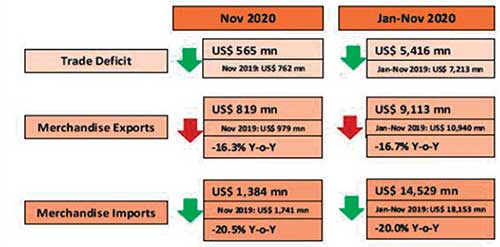Business
Deficit in trade account narrowed in November 2020

due to a larger decline in imports compared to the decline in exports.
According to the latest external trade data released by the Central Bank, country’s trade deficit narrowed in November 2020 by US $ 198 million to US $ 565 million, from [US $ 762 million] recorded in November 2019, due to a larger decline in imports compared to the decline in exports.
Amidst a decline in earnings from exports, a number of positive developments were observed in the external sector in November 2020, including a lower trade deficit, and a notable increase in workers’ remittances.
Merchandise imports continued to decline supported by the continuation of restrictions on non-essential imports and low global oil prices. There was a notable decline in merchandise exports in November compared to previous months due to disturbances to domestic production processes with the second wave of the COVID-19 pandemic.
Further, the cumulative deficit in the trade account from January to November 2020 narrowed to US dollars 5,416 million from the deficit of US dollars 7,213 million recorded in the same period in 2019.
Terms of trade, i.e., the ratio of the price of exports to the price of imports, improved by 0.6 per cent in November 2020, compared to November 2019, with import prices declining more than export prices.
Overall exports: Earnings from merchandise exports suffered in November 2020 due to the resurgence of COVID-19 cases in Sri Lanka and abroad. Earnings from exports declined by 16.3 per cent to US dollars 819 million in November 2020, compared to November 2019. This was a 3.4 per cent decline compared to October 2020. Measures imposed to combat the second wave of the pandemic locally affected production in key export sectors, garments in particular. Further, the second wave of the pandemic experienced in export markets affected demand for exports, while significant disruptions to global shipping and logistical chains also affected local businesses negatively.
Industrial exports: Earnings from the export of industrial goods declined by 19.6 per cent in November 2020 compared to November 2019, mainly due to the 37.2 per cent decline in garment exports. Health related restrictions in factories contributed significantly to this outcome. Meanwhile, earnings from the export of petroleum products declined significantly due to the reduction in bunkering quantities as well as prices. While exports of a number of smaller factory-based export sectors also declined, export earnings from some industrial export categories increased. The latter included; gems, diamonds and jewellery; rubber products (with increased exports of tyres and gloves); and plastics and articles thereof (with increased exports of personal protective equipment such as plastic clothing articles).
Agricultural exports: Export earnings from agricultural goods declined by 2.3 per cent in November 2020 compared to November 2019, due to a reduction in the export of seafood, minor agricultural products (fruits, edible nuts, betel leaves, etc.) and tea. Earnings from tea exports declined by 5.2 per cent, with declines in volumes of black and green tea exported, while unit prices of both types marginally increased. Agricultural exports that displayed an increase in earnings were spices (led by cinnamon and pepper), coconut (mainly coconut oil and non-kernel products) and rubber.